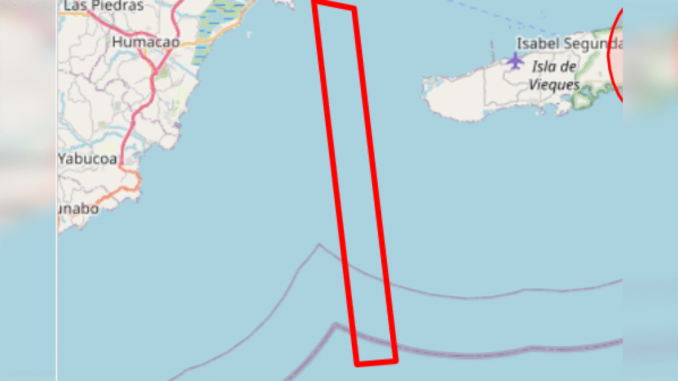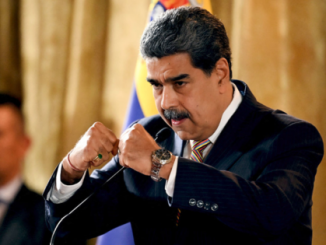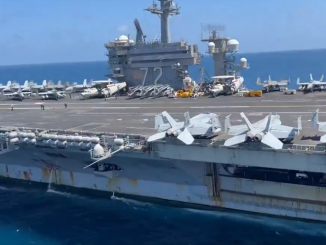
Screenshot of restricted space off Puerto Rico via FAA
Published October 31, 2025
The Federal Aviation Administration (FAA) has issued a notice restricting airspace over Ceiba, Puerto Rico, designating the area as reserved for national defense operations. The restriction, effective from November 1, 2025, through March 31, 2026, prohibits civilian and private aircraft from entering the designated zone, which spans from approximately 2,500 to 5,000 feet above mean sea level. The measure is intended to support security and operational safety for military activities in the region.
This decision comes amid rising concerns about regional instability and increased military activity in the Caribbean. While the FAA notice does not specify the exact nature of the operations, the designation allows the Department of Defense to conduct training, surveillance, and logistical maneuvers without civilian interference. The airspace restriction also ensures the safety of both military and civilian aviation during potentially sensitive operations.
The move has broader implications for civilian aviation, as private pilots and commercial aircraft must adjust flight plans to avoid the restricted area. Failure to comply could result in interception or penalties, emphasizing the importance of adherence to FAA regulations.
Beyond aviation, the declaration signals heightened military readiness in Puerto Rico, reflecting the strategic significance of the island in regional security planning. Although reports have circulated suggesting potential military operations in neighboring countries, there is no official confirmation of any imminent action. Nonetheless, the restricted airspace demonstrates the United States’ ability to project force and maintain operational flexibility in the Caribbean.
Economically, the restricted zone could have indirect effects on local businesses and maritime activity. Shipping routes may be adjusted in response to regional tensions, and local communities near Ceiba may experience temporary disruptions related to military exercises or increased security measures.
From a geopolitical standpoint, the decision is likely to draw attention from regional governments and international observers. The establishment of restricted airspace highlights the United States’ commitment to maintaining a strategic presence while signaling its capability to respond swiftly to emerging threats or contingencies.
In summary, the FAA’s declaration of restricted airspace over Ceiba represents a calculated measure to ensure military operational security while limiting civilian risk. While speculation about broader military action remains unverified, the restriction itself reflects a proactive approach to regional preparedness, signaling both deterrence and readiness amid a dynamic security environment in the Caribbean.
 Implications of the FAA declaring airspace over Ceiba, Puerto Rico as “National Defense Airspace,” especially in the context of rumors about U.S. military action toward Venezuela:
Implications of the FAA declaring airspace over Ceiba, Puerto Rico as “National Defense Airspace,” especially in the context of rumors about U.S. military action toward Venezuela:
1. Military & Security Implications
-
Heightened U.S. readiness: The airspace restriction suggests the Department of Defense is preparing or positioning forces in Puerto Rico, possibly for rapid deployment.
-
Signal to adversaries: Even without an actual land strike plan, this serves as a deterrent to Venezuela or other regional actors.
-
Use of airspace for exercises: The restricted airspace allows for training, surveillance flights, and testing of military assets (e.g., F‑35 jets) without civilian interference.
2. Aviation & Civilian Implications
-
Restricted flight operations: Civilian pilots, private planes, and commercial aircraft cannot operate in the restricted zone, potentially affecting local flight schedules and routes.
-
Safety enforcement: Violating the restriction could result in interception by military aircraft or fines, so airlines and flight operators must strictly comply.
3. Geopolitical Implications
-
Regional tension: Even without a confirmed strike, this raises concerns among Caribbean nations and Latin American governments, increasing diplomatic friction.
-
Messaging to Venezuela: The move may be interpreted as U.S. pressure on Venezuela regarding political, military, or drug-related issues.
-
International perception: Such actions can be seen as provocative, potentially impacting U.S. relations with allies who prefer de-escalation in the region.
4. Economic Implications
-
Maritime & trade risks: If tensions escalate, shipping routes near the Caribbean could face higher insurance costs or temporary rerouting.
-
Regional economy: Puerto Rico may experience temporary disruption if military exercises expand, affecting local businesses near Ceiba.
-
Investor uncertainty: Heightened military readiness in the Caribbean can influence perceptions of risk for investors and companies operating in or shipping through the region.
5. Information & Media Implications
-
Rumor vs. fact: Media reports linking the airspace restriction directly to a Venezuelan land strike are unconfirmed; spreading unverified claims could cause unnecessary panic.
-
Public attention: The story will attract scrutiny from analysts, journalists, and policymakers, making it a focal point for U.S. foreign policy commentary.
6. Broader Strategic Implications
-
Demonstration of U.S. reach: Deploying assets in Puerto Rico emphasizes U.S. ability to project power in the Caribbean and Latin America.
-
Testing operational logistics: Restrictions allow the military to practice rapid mobilization and coordination without civilian interference — useful for planning any future contingencies.
-
Potential prelude: While a strike on Venezuela is not confirmed, the move keeps options open for U.S. leadership if strategic circumstances change.
 Overall Takeaway:
Overall Takeaway:
The FAA’s declaration of airspace over Ceiba, Puerto Rico as “National Defense Airspace” underscores a significant U.S. military posture in the Caribbean. While the restriction itself is officially aimed at ensuring operational security and safety, it carries broader implications—signaling readiness, influencing regional geopolitics, and affecting civilian aviation. Rumors of a potential U.S. land strike on Venezuela remain unconfirmed, and there is no official authorization or public evidence of imminent action.
What is clear is that the move reflects a strategic demonstration of U.S. military capability and preparedness, sending a strong message to regional actors while emphasizing the importance of vigilance, verification, and careful analysis in interpreting these developments. Observers and analysts should continue monitoring official updates, as the situation remains fluid and could have lasting security, economic, and diplomatic consequences in the Caribbean and beyond.
SOURCES: THE GATEWAY PUNDIT – FAA Declares Airspace Over Ceiba, Puerto Rico ‘National Defense Airspace’ Amid Rumors of a U.S. Potential Land Strike on Venezuela





Be the first to comment